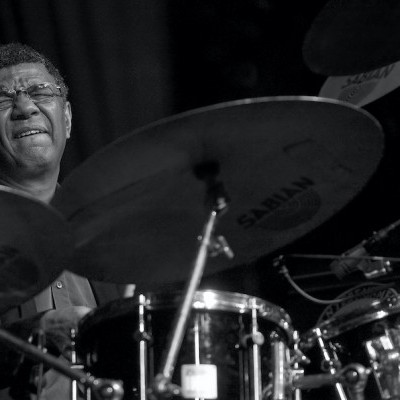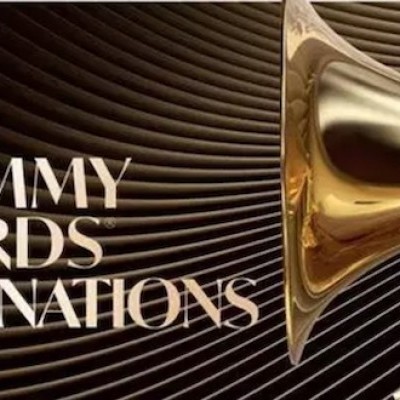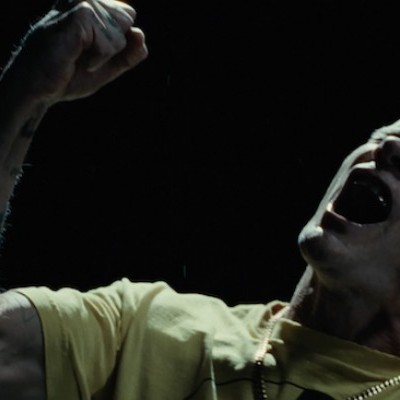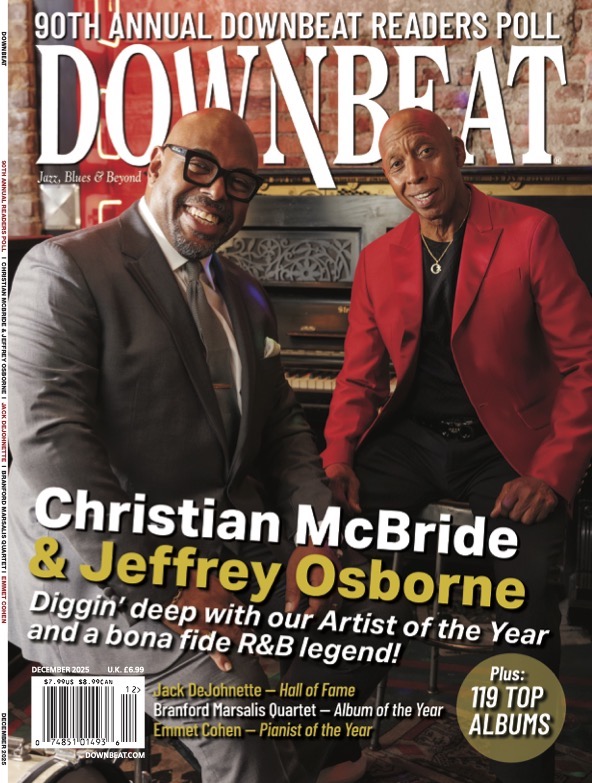Oct 28, 2025 10:47 AM
In Memoriam: Jack DeJohnette, 1942–2025
Jack DeJohnette, a bold and resourceful drummer and NEA Jazz Master who forged a unique vocabulary on the kit over his…
For 2018, its 33rd iteration, the Congressional Black Caucus Foundation’s annual jazz concert presented one of its most ambitious programs in recent memory. Acclaimed drummer, vibraphonist and composer Joe Chambers helmed a four-piece incarnation of M’Boom, the percussion ensemble founded by the late Max Roach, augmenting it with a string quartet, saxophone, bass and vocals in a performance of Chambers’ arrangements.
It was a year of changes for the concert, which has been a staple of the CBCF’s Annual Legislative Conference since 1985. It was separated for the first time from the overall conference, which takes place at the Walter E. Washington Convention Center downtown. The concert was moved to a dedicated music venue: City Winery, a multi-city franchise whose D.C. location is in the far-flung industrial neighborhood of Ivy City. In addition, the concert since its inception has been free to conference registrants; this year, it came with a separate admission price.
It also had a new host: Rep. Sheila Jackson Lee (D-TX) did the honors. Rep. John Conyers (D-MI), who had hosted the concert since its inception, recently retired amid harassment claims.
“If you have listened to the classic Blue Note recordings from the 1960s, you probably have heard Joe Chambers on them,” noted Keanna Faircloth, a D.C. jazz radio personality, who introduced the evening’s headliner. Rarely has he been heard in quite such a context as this, though. Chambers (playing vibraphone) was a founding member of Roach’s M’Boom ensemble in 1970—as was Warren Smith, who this night performed on timpani, kettle and bass drums—but where Roach’s incarnation was seven pieces at its smallest, this band was stripped down to four percussionists, with drummer Bobby Sanabria holding down the trap kit and Italian-born Diego Lopez on hand percussion.
M’Boom’s leanness was complemented by the addition of the String Queens, a classical string quartet, as well as saxophonist Brian Settles and bassist Herman Burney. From the start, Chambers used these resources like he used M’Boom—to their fullest rhythmic potential. Even the strings played stabbing ensemble fills on Roach’s “It’s Time,” adding momentum to an already energized vibes solo from Chambers and dramatic dialogue between Smith’s kettle drums and Sanabria’s spang-a-lang ride cymbal. Lead violinist Kendall Isadore also took a furious solo, as did Settles, pummeling the groove with his own free-flowing counter-rhythm.
Though Chambers was unquestionably the leader—and received a CBCF Jazz Legacy Award later in the evening—Settles was one of the evening’s stars. His big sound and massive vocabulary powered through several tunes, including an intoxicating Brazilian roll of a song that Settles pivoted into a pan-African scramble. He outdid himself on “Epistrophy,” the first tune following the intermission, with a long, shatteringly bluesy line. He occasionally broke out a soprano saxophone, too, and let it run pell-mell, as on the closing “Caravan.”
“Caravan” also featured the evening’s other star, singer Mavis Swan Poole. Her voice is a paradox: both disarmingly dulcet and penetrating enough to overcome the room’s acoustic shortcomings. In the first set, she appeared only once, for Chambers’ stirring arrangement of Janet Jackson’s “Come Back To Me.” Her voice was a smooth blend of Billie Holiday, Macy Gray and Eartha Kitt. Poole’s rhythmic sensibility, however, was something else again; more than a match for M’Boom and the String Queens, who closely accompanied her singing.
In the second act, Poole returned in a gold turban that seemed determined to evoke Kitt. She again joined with the String Queens to do the heavy lifting on “Never Let Me Go,” with Settles providing remarkably delicate fills—then abandoning them with a growling wail of a solo. Admirable as Settles’s soprano was on “Caravan,” it was secondary to Poole’s bravura performance. Although she took the first line too high and had to drop an octave for the remainder, she made up for it with a long, luxuriant, everything-but-the-kitchen-sink scat solo that might have made Ella Fitzgerald gasp, then a speed-reading vocalese chorus that she attacked with glee.
Unfortunately, the sound system did little justice to the glorious music. The concert took place at City Winery’s rooftop bar, but spectators largely were crammed into its back half and became a buzzing hive of conversation. It deadened the acoustics of the room. Alas, the sound technicians compensated by putting every instrument at the same volume, resulting in a flat, dimensionless blare that often was swallowed in percussion. Bassist Burney, for one, was entirely inaudible, unless he was accompanying a percussionist’s solo. Others had the opposite problem: Isadore, turning in an otherwise splendid solo on “Poema Para Ravel,” ended it with a (surely unintentional) ear-splitting shriek.
The good news was that the talent involved with the performance managed to transcend that sonic handicap. DB

Jack DeJohnette boasted a musical resume that was as long as it was fearsome.
Oct 28, 2025 10:47 AM
Jack DeJohnette, a bold and resourceful drummer and NEA Jazz Master who forged a unique vocabulary on the kit over his…

Goodwin was one of the most acclaimed, successful and influential jazz musicians of his generation.
Dec 9, 2025 12:28 PM
Gordon Goodwin, an award-winning saxophonist, pianist, bandleader, composer and arranger, died Dec. 8 in Los Angeles.…

D’Angelo achieved commercial and critical success experimenting with a fusion of jazz, funk, soul, R&B and hip-hop.
Oct 14, 2025 1:47 PM
D’Angelo, a Grammy-winning R&B and neo-soul singer, guitarist and pianist who exerted a profound influence on 21st…

To see the complete list of nominations for the 2026 Grammy Awards, go to grammy.com.
Nov 11, 2025 12:35 PM
The nominations for the 2026 Grammy Awards are in, with plenty to smile about for the worlds of jazz, blues and beyond.…

Flea has returned to his first instrument — the trumpet — and assembled a dream band of jazz musicians to record a new album.
Dec 2, 2025 2:01 AM
After a nearly five-decade career as one of his generation’s defining rock bassists, Flea has returned to his first…





